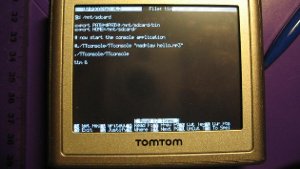Microsoft has filed a patent infringement lawsuit against navigation device maker TomTom. The suit alleges that several of TomTom's products, including some that are Linux-based, infringe on a handful of Microsoft's patents. Several of the patents in question relate to car computing systems and navigation, but there are also two that cover Microsoft's FAT32 filesystem. If Microsoft begins to systematically enforce its FAT32 patents, it could have broad ramifications for the Linux platform and for mobile device makers.
The lawsuit, which was reported today at Todd Bishop's Microsoft blog, is thought to be the first time that Microsoft has directly targeted Linux with patent litigation. In an interview with Bishop, Microsoft deputy general counsel for intellectual property Horacio Gutierrez claims that this is not the beginning of a broader intellectual property campaign against Linux. Gutierrez characterizes the lawsuit as a last resort option that Microsoft is pursuing after attempting to negotiate a private settlement with TomTom for over a year.
Two of the patents in question are #5,579,517 and #5,758,352 which cover techniques for implementing a "common name space for long and short filenames." The patents basically cover a backwards compatibility hack that Microsoft implemented in its filesystem to preserve compatibility with the filename munging scheme that was used in MS-DOS where filenames were limited to 11 characters in length. The software methods described in the patent are used in modern variants of Microsoft's FAT filesystem.
Microsoft's FAT patents have been vigorously challenged in court, but were finally upheld in 2006. Eben Moglen—a Columbia University law professor and the chairman of the Software Freedom Law Center—once described the FAT patents as a "proverbial Sword of Damocles hanging over the open source community" and warned that Microsoft could use them to do immense damage to the Linux platform. Indeed, Microsoft's filesystem format is used broadly on external storage devices such as camera memory cards.


 Loading comments...
Loading comments...
